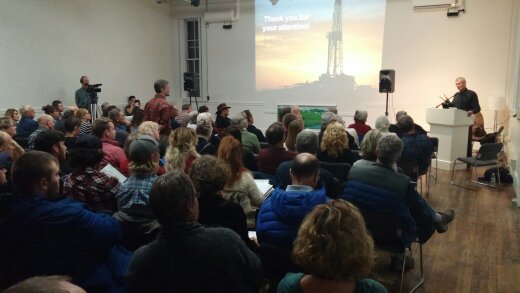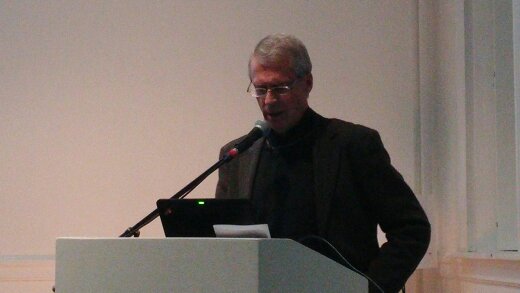There isn’t enough evidence showing the impacts of shale gas extraction to justify a science-based decision to develop the resource in Atlantic Canada.
This was the key message delivered during a lecture in Fredericton last night by Dr. John Cherry, the chair of the 2014 Council of Canadian Academies panel on hydraulic fracturing.
Dr. Cherry was in the provincial capital this week to meet with the New Brunswick Commission tasked with reviewing the moratorium on hydraulic fracturing in NB. He also gave a public lecture to a crowd of roughly 150 people focused on the review he conducted with the Council of Canadian Academies panel on shale gas fracking, which was commissioned by Environment Canada.
After extensively researching the literature, the science and the experts’ review around hydraulic fracturing, Dr. Cherry’s conclusion is clear: there is a worldwide lack of scientific monitoring on shale gas extraction that would enable any science-based decisions to justify development on Canada’s east coast.
In his presentation, Dr. Cherry noted that “when the industry started approaching the places where we live, this changed everything.” He assured the audience that “New Brunswick is the norm. A moratorium on shale gas fracking is the norm. New Brunswick is not an exception,” indicating that the policy of the New Brunswick government, put in place almost one year ago, is in line with most other provinces, states and countries.
When asked what advice he would offer the NB Commission and the provincial government, Dr. Cherry said,
“given where New Brunswick is at, given there is currently a moratorium policy, it makes sense to continue that moratorium into the future. The east coast, and New Brunswick, is not suitable for experimentation.”
Cherry, a distinguished and widely-published expert on groundwater monitoring, chaired the 2012-2014 panel of 16 North American experts on a wide range of issues related to shale gas. Five of the panelists were groundwater experts while others were from disciplines such as health, toxicology, engineering, geology, and sociology.
After two years of reviewing the literature on hydraulic fracturing, the panel concluded that:
- water contamination from leakage around improperly sealed well bores and migration through geological fractures, poses the largest risk from the industry;
- Increased greenhouse gas emissions, seismic activity, socioeconomic disruption and poor scientific monitoring pose a problem for shale gas extraction;
- There is a lack of knowledge of health and social effects from development; however minimally, a Health Impact Assessment framework is required at the provincial level to determine short and long term impacts;
- There has been no comprehensive investment in the research and monitoring of environmental impacts;
- Of data that is available it mostly is not public; and
- If the shale boom takes investment away from renewable power, it could make climate change situation worse.

Dr. Cherry not only talked about the lack of coordinated monitoring for science-based decision-making on the issue of shale gas, he also commented on the degradation of basic groundwater monitoring programs in Canada. He noted that these basic programs and regulatory frameworks are lacking, citing the failure to implement New Brunswick’s water classification program as a prime example. If enacted, the water classification program would be a valuable tool of baseline understanding that enables regulators — and the public — to track the state of the environment and determine whether whater quality conditions are maintaining, getting worse, or improving. Until these systems are in place, says Dr. Cherry, there is no way of knowing the impacts.
In concluding his presentation, Dr. Cherry indicated he would like to have the opportunity to review shale gas fracking impacts in the context of a whole energy strategy for the country, noting none of the expert panels ever convened on shale gas fracking, and their reports, has ever been tasked with reviewing or laying out the full gamut of and impacts of energy options for discussion.

